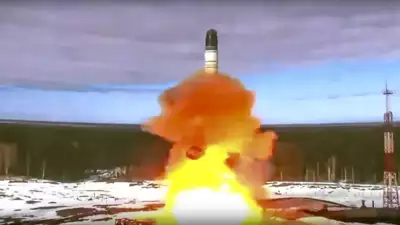- News
- World News
- Europe News
- Big escalation: 'Russia launches ICBM strike' against Ukraine, shoots down UK Storm Shadow missiles
Trending
Big escalation: 'Russia launches ICBM strike' against Ukraine, shoots down UK Storm Shadow missiles
Russia launched an ICBM from the Astrakhan region, targeting Dnipro in Ukraine. This marks the first use of such a weapon in the ongoing conflict. The attack, which also involved Kh-101 cruise missiles, follows Ukraine's use of Western-supplied long-range missiles against targets within Russia. Moscow had previously warned that such actions would be considered a major escalation.

Representative image (Picture credit: AP)
The strike targeted enterprises and critical infrastructure in Dnipro, a central-eastern Ukrainian city. It is unclear whether the missile caused significant damage.
Ukraine’s air force stated, “An intercontinental ballistic missile was launched from the Astrakhan region of the Russian Federation.”
Security experts said it would be the first military use of an intercontinental ballistic missile, Reuters reported.
As per The Telegraph, Russian media reported that Moscow might have used the RS-26 Rubezh missile, capable of carrying both conventional and nuclear warheads and flying at hypersonic speeds, complicating interception efforts.
ICBMs typically have a range exceeding 5,500 kilometres and are designed to carry nuclear or conventional warheads.
This attack stresses escalating tensions after Ukraine recently used US-made ATACMS and British-French Storm Shadow missiles to strike targets deep within Russian territory, according to Reuters.
As the Ukraine made a first move, the Russian defence ministry today said that its air defence systems shot down two British-made Storm Shadow missiles, six HIMARS rockets and 67 drones.
The announcement came in the ministry's daily roundup of the "special military operation" in Ukraine, AP reported.
The European Union said that the attack by Russian President Vladimir Putin marked a "clear escalation" in the war.
"While we're assessing the full facts it's obvious that such (an) attack would mark yet another clear escalation from the side of Putin," EU foreign affairs spokesman Peter Stano told reporters, saying the move would represent a "quantitative and qualitative change" in the war, AFP reported.
The use of an ICBM follows President Vladimir Putin’s recent update to Russia’s nuclear doctrine. On Tuesday, he announced that Russia would consider aggression from a non-nuclear state, supported by a nuclear power, as a direct threat to its sovereignty.
The Kremlin had previously warned that Ukraine’s use of Western long-range missiles would be seen as a major escalation.
Ukrainian forces used these advanced weapons to hit Russian military installations earlier this week.
Moscow responded with threats of “massive” retaliatory strikes, including the deployment of more advanced missile systems.
Kremlin spokesperson Dmitry Peskov declined to comment on the ICBM deployment. “That’s a question for our military,” he said.
End of Article
FOLLOW US ON SOCIAL MEDIA
Visual Stories
Hot Picks
TOP TRENDING
Explore Every Corner
Across The Globe
Most uncapped playersArvind KejriwalCSK Full SquadMI Squad Projected 11Chennai School Holiday Tomorrow
RCB Squad Projected 11Hindu Temple AttackIPL Most Expensive PlayerCKS Squad Projected 11IPL Teams Squads











